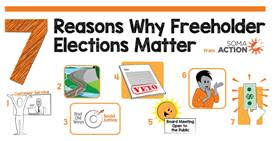From SOMA Action:

Here are seven reasons why all New Jerseyans should carefully consider their votes in freeholder elections.
- They’re your county government’s “customer service.” Whether it’s un-plowed snow on county roads or un-picked-up trash in county parks, freeholders are your go-to point person. In fact, freeholders often campaign on their responsiveness to their constituents and their ability to get things done for you.
- It’s always “Infrastructure Week.” As NJ.com reported in 2014, “Take a look at most freeholder agendas and… you’ll find a big chunk of their action items have to do with seemingly boring but crucial topics — paving roads, repairing dams and building bridges.” That last one is especially key. As New Jersey Association of Counties Executive Director John Donnadio told the outlet, the vast majority of bridges statewide, aside from those that cross state lines, fall under freeholders’ purviews.
- When it comes to social justice, they can move the needle on big, structural, changes statewide. For example, Essex County freeholders have passed resolutions supporting the legalization of marijuana statewide, calling on ICE to release civil detainees and calling for changes in policing to help protect black lives.
- They’ve got veto power. The Board of Freeholders can overrule vetos made by Essex County Executive Joseph N. DiVincenzo Jr.
- They’re like the human embodiment of sunshine laws. Other than things like contract negotiations and employment matters, a Chosen Board of Freeholders operates in public and is transparent by design. That’s unlike the County Executive, who can have closed-door meetings and even create policy in private. Likewise, freeholders’ votes to pass or reject legislation, select vendors and award contracts, etc. must be conducted via public meetings.
- In Essex County especially, their individual platforms matter. Says West Orange resident Matt Dragon, who frequently interacts with county executives and freeholders in his advocacy work for correctional facility civilian oversight, “In a county where there’s a single party in control, you want freeholders that are going to think for themselves and represent their constituents, not just stamp whatever the administration submits. Essex fits both those criteria.”
- The buck stops with them — literally. Essex County’s government website notes that the Board of Freeholders approves the county’s annual operating and capital budgets and designates staff to process and approve funding. Or, as SOMA Action Political Action Committee chairperson Rebecca Scheer succinctly puts it, “They decide where the money gets spent — which is huge.”

